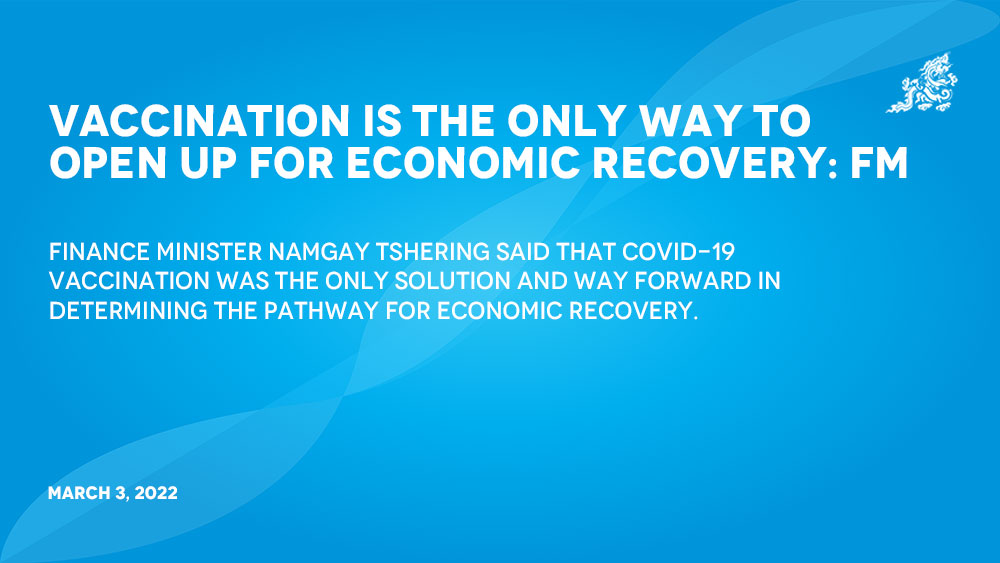Thukten Zangpo
Finance Minister Namgay Tshering said that Covid-19 vaccination was the only solution and way forward in determining the pathway for economic recovery.
“As the countries across the globe are moving towards living with the virus based on the efficacy of the vaccination, we still need to adopt a cautious approach even with the roll-out of a third booster dose to avoid jeopardizing the efforts in saving lives and livelihoods for the larger benefit of the country,” he said.
Lyonpo said that access to vaccines and achieving herd immunity was the only way for economic functionaries to produce and meet the required demands in an economy. “Vaccine policy is the new economic policy.”
Besides shots in the arm, he added that the smart Covid-19 health and safety protocols supported by strong policy measures are critical to steering the economy towards a recovery path. “The investments and investment-enhancing reforms have to be targeted for economic recovery.”
Bhutan saw high vaccination coverage with more than 600, 000 people (81.1 percent of the total population) having received at least one dose of vaccine, and more than 580,000 (77.8 percent) had received the second dose as of March 1 this year.
Booster coverage above 18 years of age is at 89.1 percent. Only 18.9 percent of the total population are not vaccinated.
Economic growth
Bhutan’s economy contracted by 3.9 percent in 2020 as the gross domestic product (GDP) dropped to Nu 171.75 billion (B) from Nu 178.56B in 2019 mainly due to Covid-19 restrictions.
However, His Majesty The King, through the Druk Gyalpo’s Relief Kidu (National Resilience Fund), provided relief during the period in the form of deferment on loans, interest support, and income support to individuals directly affected by the pandemic.
Lyonpo also said that various fiscal and monetary measures helped to mitigate the socio-economic costs of the pandemic, providing a breathing space for the sustenance of business activities.
He added that the government also ensured the facilitation of basic economic activities in self-containment mode, trade facilitation, and continued supply of essential imports even during the peak of the pandemic.
Tourism-related travel was restricted given the risk of widespread community transmission from outside.
According to the macro-economic framework coordination committee led by the finance ministry, with representations from key economic sectors, economic growth for 2021 is estimated at 3.67 percent.
Lyonpo said that economic growth was estimated with the expectation of broad-based recovery from economic sub-sectors, improved trade performance, and continuity in government capital
investments.
For the fiscal year 2022-23, the finance ministry forecast GDP or economic growth rate of 6.3 percent on the assumption that there are no major lockdowns in the country and the ongoing escalation in other parts of the world subsides and improves.
However, Lyonpo said that the recent development in the world economy triggered by full-scale war between Russia and Ukraine will have the spiral effect of shocks in global oil prices which will aggravate the existing inflationary pressures in Bhutan and also pose some risk to the current account deficit.
According to the International Monetary Fund’s World Economic Outlook, global growth saw a rebound from -3.1 percent in 2020 to 5.9 percent in 2021.
However, the growth forecast for 2022 has been downgraded from 4.9 percent to 4.4 percent due to rising caseloads from Omicron variant spreads, rising energy prices, and higher inflation.
Economic recovery plans
Lyonpo said that the policy support through fiscal and monetary measures will have to be continued in a targeted manner supplementing other policy measures.
He added that the government was currently working in close collaboration with relevant stakeholders, including the monetary sector, for appropriate stimulus measures post-June 2022
The government’s fiscal policy is expected to remain expansionary with higher budget allocations to support appropriate policy measures while also ensuring it does not impose a significant impact on the reserves.
Lyonpo said that the government is also reviewing the existing measures to implement targeted interventions, facilitate access to credit, and upscale operation of the National Credit Guarantee Scheme with the government guarantees as counter-cyclical policy measures to revive the economy by ensuring targeted financing in the priority sectors.
A similar financing window has been operationalised in the National CSI Development Bank to enhance production in Agriculture and CSI sectors, he added.
Through the Fiscal Incentive Act 2021, the government urged the businesses to avail the incentives which are targeted towards propelling private sectors as the main engine of economic growth.
Lyonpo said that various fiscal reforms are also underway, some of which will be implemented in a phased manner.
He also said that the government would ensure easy access to finance and affordable borrowing.
The three-tiered Non-Performing Loan (NPL) Reduction Committee has been constituted at the national level to resolve NPL issues.
Through this committee, selected highly stressed NPL accounts are parked under asset pending foreclosure with the objective to reduce impairment and improve the capital adequacy ratio as stipulated in the Royal Monetary Authority’s (RMA) Prudential Regulation.
Financial institutions have instituted NPL Reduction Measures and Strategy targeting the loan category in terms of expiration and loss with the option for account closure and regularization based on the directives of the committee.
Lyonpo said that financial institutions (FIs) would be strategizing means to leverage private sector investment and RMA is fully on board to ensure the resilience of the financial institutions to support private sector growth.
He added that the FIs will also come up with strategies to mitigate the challenges posed by the pandemic, especially with regard to resolving NPL issues and taking credit growth to the pre-pandemic level.
“Our goal is to emerge stronger from the pandemic and build resilience for inclusive and sustainable economic growth,” Lyonpo said.


